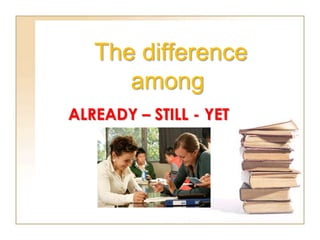Understanding the difference between already, still and yet
•Download as PPTX, PDF•
0 likes•1,398 views
This document provides information on the meanings and usage of the adverbs "already", "still", and "yet". It states that "still" is used to refer to something continuing longer than expected, usually placed before the verb in a sentence. "Yet" is mostly used in questions and negatives, placed at the end of a sentence or question to indicate expectation. "Already" refers to things that have happened earlier than expected, usually placed before or after the verb.
Report
Share
Report
Share

More Related Content
What's hot
What's hot (20)
Viewers also liked
Viewers also liked (20)
Similar to Understanding the difference between already, still and yet
Similar to Understanding the difference between already, still and yet (20)
Presente simple y presente continuo o progresivo .pdf

Presente simple y presente continuo o progresivo .pdf
as soon as , as long as, once, in order for conjuncions.pptx

as soon as , as long as, once, in order for conjuncions.pptx
More from dianA
Understanding the difference between already, still and yet
- 1. Thedifferenceamong ALREADY – STILL - YET
- 2. Today we present some basic information for understanding the meaning of these adverbs and where to put them in sentences
- 3. STILL We use 'still' to talk about something, a situation or an action, that's continuing, often for a longer time than expected. It hasn't changed or stopped. 'Still' usually goes in the middle of the sentence, before the verb.
- 4. YET We use 'yet' mostly in questions and negative sentences. Using 'yet' shows that we're expecting something to happen or have happened. In spoken English 'yet' almost always comes at the end of the sentence or question and is commonly used with the present perfect.
- 5. ALREADY We use 'already' to talk about things that have happened, often earlier than expected. It usually goes in the middle or the end of sentence, just before or after the verb and is also commonly used with the present perfect.